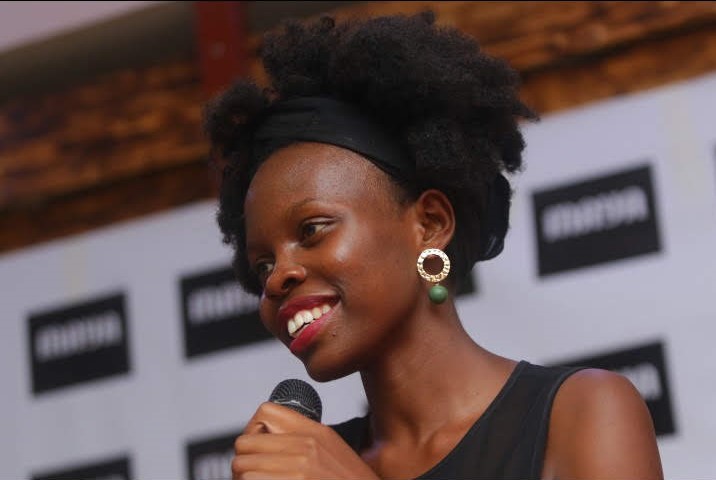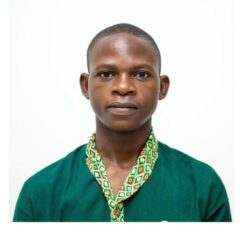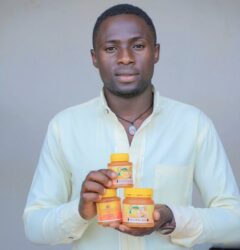01 Jul

Cynthia Stacey Wambutsi loves flowers. They have been symbolic of ideals that she wants to carry into mental health. With a mind being one of the major sources of drive and functionality for human beings, she hopes that everyone’s mind can thrive, bloom and change things for the better wherever it is. This is why she named her mental health organization, “Mind Bloom.”
A young woman of various passions and abilities, Wambutsi is a writer, a podcaster and has a passion for reproductive health. In 2019, she was intrigued about mental health after a personal experience with depression and anxiety.
“I always had answers to everything but for the first time I was confused about what was happening to me and how to make it stop,” Wambutsi narrates.
The Idea
It is in this personal crisis that she sought for an answer to the magnitude of sadness and anxiety she experienced for long periods of time. She began looking for resources on mental health to help others.
With time, she came up with a mental health concept that included raising awareness, building a network of professionals and community outreach programs for people that are vulnerable to mental health problems.
Lessons Start Your Startup training
While her concept was still at the idea stage, opportunity knocked in the form of a call for young people who wanted to develop their ideas into startups, from StartHub Uganda.
She responded to the call and began attending the nine-week training called Start Your Startup. The training was run by StartHub Uganda and The Innovation Village with the support of the Mastercard Foundation.
“I have never been a business person and therefore, prior to this training, I had a clear plan on how to make this work. It is at StartHub that I found mentors who took me through several sessions that developed this idea to where it is now. We learned about human-centered design, marketing and business sustainability. That training was wonderful,” Wambutsi speaks to the benefits of the training.
With the help of the training, she has since changed her business model to be more client-based and flexible. She has improved her marketing strategy, built strong networks, collaborative engagements and has been able to categorize her clientele and identify the early adopters.
Growing the organization
Wambutsi started out as a sole employee but has since gone on to build a team of six staff; four psychologists and two aides who have pushed the cause of Mind Bloom. In their full-time jobs, her employees earn an income that supports their households.
Most importantly, she is working with her team to positively impact the lives of many young people who are exposed to situations that lead to mental health breakdown.
After the training, she decided to focus Mind Bloom on three areas. The first area is providing mental health care packages for workplaces.
Wambutsi says her interest in mental health at workplaces emanates from the knowledge that one’s mental state of being, greatly influences one’s productivity, emotional intelligence and ability to deal with cognitive dissonance, all of which are critical in strengthening one’s capitals. For this group, Mind Bloom has mental health care packages involving preventative and curative practices to ensure that employees are in great mental shape and that their workplaces foster healthy minds for employees.
The second area that Mind Bloom focuses on, is about People living with HIV/AIDS. In her research, a lot of people living with HIV/AIDS also have mental health challenges as they try to live with the disease. With psychotherapy, she ensures these people are given the resources to cope with stigma as well as live positively.
To date, Mind Bloom has benefited groups of young persons living with HIV/AIDS in Mbale and Iganga in addition to university students within Kampala. Additionally, the team has run a series of online conversations tailored to support professionals dealing with the effects of COVID-19 on mental health and productivity.
The third group that Mind Bloom focuses on are refugees. Due to the resultant trauma from displacement by conflict or disasters, refugees have lots of challenges coping with sudden changes regarding moving from their homes and having to integrate into new communities. The organization has had an impact working with female Congolese Refugees who live in Nsambya, a Kampala suburb. With a team of psychotherapists, Mind Bloom has held therapy sessions for 40 people. It continues to hold weekly group therapy sessions for 10-12 people on a weekly basis in Nsambya.
Beneficiaries speak out
One of the beneficiaries of the mental health efforts of Mind Bloom, is 23-year-old student, Gonza Kizito (not real name). Kizito signed onto Mind Bloom during May, which is also the international month for mental health. Through WhatsApp, he attended group therapy and interpersonal therapy with an assigned therapist.
“I suffered from depression and loneliness. I had problems in relationships and work. When I began the sessions, I was able to learn a lot of things about myself and how to deal with each of my problems. I learned of things I can do to prevent getting back to the place where I was. Right now, I feel better. I have dealt with depression and loneliness through practices that I was taught. It is also great that the people from Mind Bloom keep in touch to check on me and encourage me on the path to wellness,” he says.
Future prospects
At the moment, Wambutsi strives to create her dream of community-based solutions for mental health that are ever-present with or without health professionals.
“I want to see a community leader, perhaps in a slum community, who has awareness about mental health problems. I wish that this leader has the ability to recognize those problems and handle them to an extent and also link his or her people to professionals,” Wambutsi says.
In addition to her efforts, she says there is a web-based app in the pipeline that will ensure access to mental health wherever someone is.
The app is a game-changer. For now, access to funding and collaboration across entities will be key in its development. As Wambutsi carries the vision of Mind Bloom, The Innovation Village commits to collaborating with young people whose solutions transform their communities.










Recent Comments